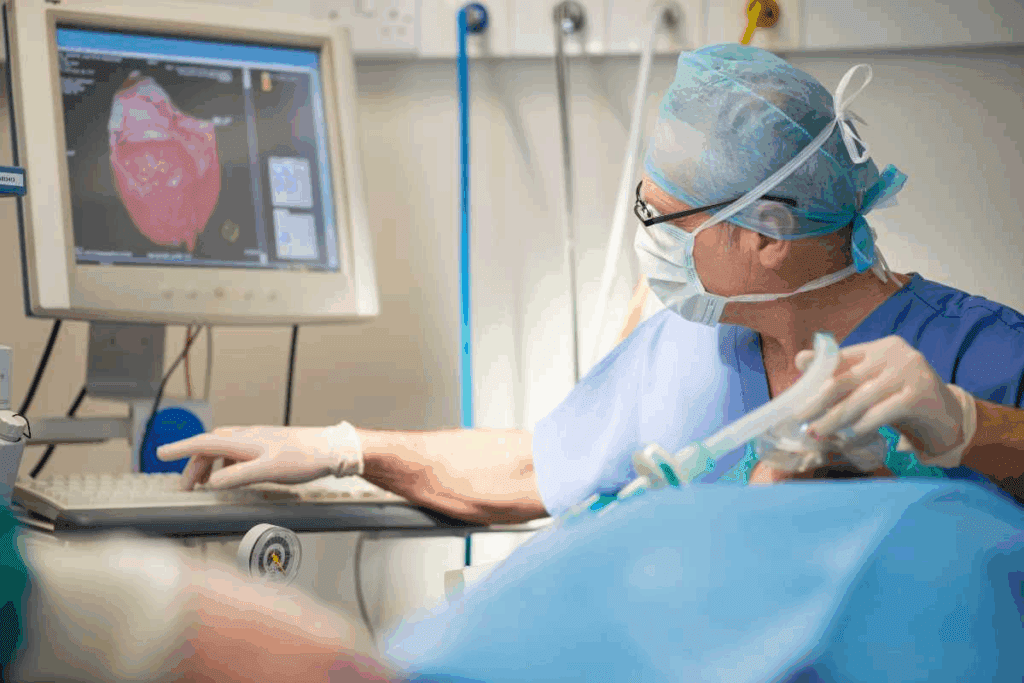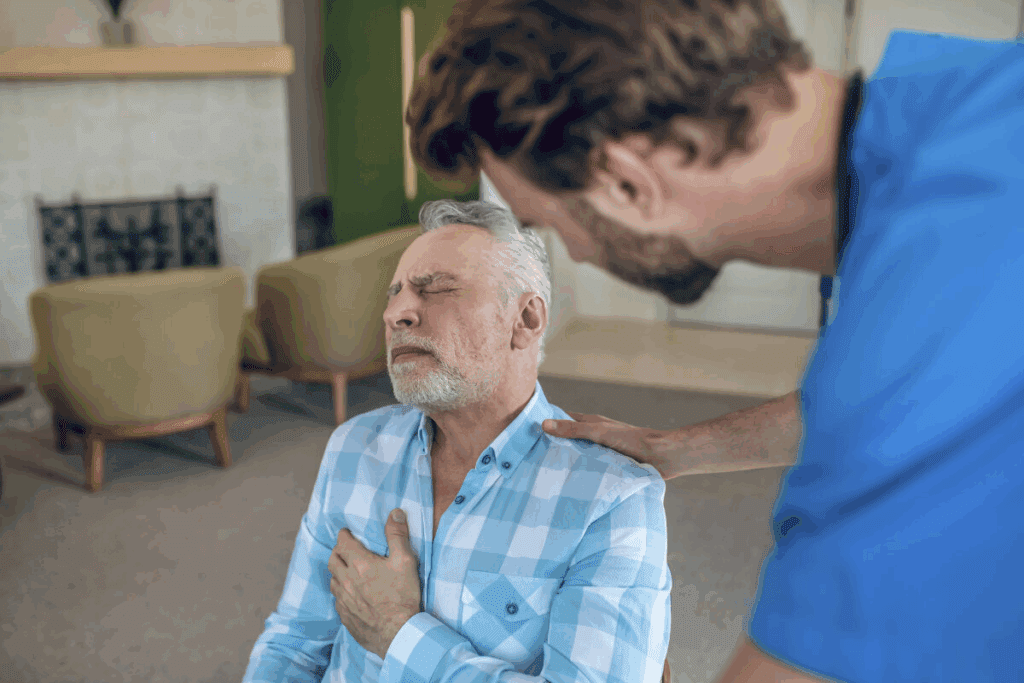Last Updated on October 31, 2025 by Batuhan Temel

Feeling an irregular heartbeat can be scary. You might think it’s a big deal or that it will go away by itself. At Liv Hospital, we get it and aim to give you top-notch heart care. We follow the latest research and global standards.
Heart arrhythmia, or irregular heartbeat, can be mild or serious. Some types need treatment, while others might not. New treatments like catheter ablation can cure some arrhythmias, with success rates up to 95-98 percent.
We know how important it is to figure out if you need medical help or if simple changes can help. Our goal is to teach and comfort you. We want to help you take care of your heart health.
Learn can irregular heartbeat be cured and whether it can go away on its own.

It’s important to know if an irregular heartbeat is just a minor issue or a sign of something serious. An irregular heartbeat, or arrhythmia, happens when the heart’s rhythm gets disrupted. This can lead to serious health problems.
An irregular heartbeat means the heart’s rhythm is off. This can show up as a heart rate that’s too fast, too slow, or irregular. This usually happens when the heart’s electrical system gets messed up. Arrhythmias can be harmless, but they can also mean there’s a bigger heart problem that needs doctor’s care.
The heart’s rhythm is controlled by a complex system of electrical signals. The heart’s SA node acts as its natural pacemaker, sending out electrical impulses. These impulses go through the AV node and then to the ventricles, making the heart beat in sync. Knowing how this works helps us understand arrhythmias.
Arrhythmias are pretty common, more so in older people. Atrial fibrillation (AFib) is a type of arrhythmia where the heart’s upper chambers get chaotic. Risk factors for AFib include age, high blood pressure, heart disease, and lifestyle choices like drinking too much alcohol.
| Risk Factor | Description | Impact on Arrhythmia Risk |
| Age | Increasing age is a significant risk factor. | Higher risk with advancing age |
| High Blood Pressure | Hypertension can lead to heart disease. | Increases risk of developing arrhythmias |
| Heart Disease | Pre-existing heart conditions can cause arrhythmias. | Significantly increases arrhythmia risk |
| Lifestyle Factors | Excessive alcohol consumption and smoking. | Can trigger arrhythmias in susceptible individuals |
Knowing about these risk factors and what irregular heartbeat is can help people understand their own risk. It can also help them take steps to keep their heart healthy.

It’s important to know about the different heart arrhythmias. Each type has its own signs and health effects. Knowing this helps in managing and treating them better.
Tachycardia means your heart beats too fast, over 100 times a minute. It can happen due to stress, some medicines, or heart problems. You might feel your heart racing, get dizzy, or have trouble breathing.
Bradycardia is when your heart beats too slow, under 60 times a minute. It’s normal for athletes, but not for everyone. It can signal problems like low thyroid or heart issues. You might feel tired, dizzy, or faint.
Premature contractions, or ectopic beats, make your heart beat too early. You might feel skipped beats or heart racing. While usually harmless, they can sometimes point to a bigger issue.
Atrial fibrillation is when your heart beats fast and irregularly. It can cause heart racing, shortness of breath, and tiredness. Atrial flutter is similar but the heart beats faster in a more regular way.
| Type of Arrhythmia | Characteristics | Common Symptoms |
| Tachycardia | Fast heart rate (>100 bpm) | Palpitations, dizziness, shortness of breath |
| Bradycardia | Slow heart rate ( | Fatigue, dizziness, fainting |
| Premature Contractions | Early heartbeats | Skipped beats, palpitations |
| Atrial Fibrillation/Flutter | Rapid, irregular heartbeats | Heart palpitations, shortness of breath, fatigue |
A medical expert says, “Knowing the type of arrhythmia is key to the right treatment.” Treatment often includes lifestyle changes, medicines, and sometimes surgery.
“The diversity of arrhythmias requires a personalized approach to diagnosis and treatment. This ensures each patient gets care suited to their condition.”
— Medical Expert, Cardiologist
Irregular heartbeat, or arrhythmia, can come from many sources. These include lifestyle choices, medical conditions, and genetics. Knowing what causes it helps us find ways to prevent it. We’ll look at how these factors affect our heart health.
Our lifestyle choices greatly impact our heart health. Too much caffeine and alcohol can lead to arrhythmias in some people.
Smoking and not being active can also harm our hearts. Eating well and keeping a healthy weight helps prevent arrhythmias.
Many medical issues can cause irregular heartbeat. Heart disease, like coronary artery disease, is a big risk factor.
Thyroid problems, such as hyperthyroidism and hypothyroidism, can also cause arrhythmias. High blood pressure and diabetes increase the risk of irregular heartbeat too.
Some medicines and substances can cause irregular heartbeat. Medications for high blood pressure, thyroid issues, or asthma can have this side effect.
Illicit drugs and too much of certain over-the-counter medicines can also lead to arrhythmias.
Genetics can also play a part in irregular heartbeat. If your family has a history of arrhythmias or heart problems, you might be at risk.
Genetic conditions like long QT syndrome and Brugada syndrome can affect heart rhythm.
Whether an irregular heartbeat can be cured is a complex question. It depends on many factors. The term “cure” means getting rid of the condition completely. But, arrhythmias have different causes and effects.
When we talk about curing arrhythmias, we mean stopping the irregular heartbeat for good. But, it’s hard because arrhythmias are different and so are the people they affect.
“The goal of treatment is not just to restore a normal heart rhythm but to improve the patient’s quality of life and reduce the risk of complications.”
Catheter ablation is a good treatment for some arrhythmias. It’s a small procedure that uses energy to fix the heart’s electrical problems.
Research shows catheter ablation works well, with a success rate of 95% to 98%. This is true for conditions like SVT and atrial flutter.
| Arrhythmia Type | Success Rate of Catheter Ablation |
| Supraventricular Tachycardia (SVT) | 95-98% |
| Atrial Flutter | 90-95% |
Sometimes, surgery is needed to fix arrhythmias. The Maze procedure is one example. It makes scar tissue in the heart to fix electrical signals.
Surgery is usually a last resort when other treatments don’t work.
Even though treatments like catheter ablation and surgery work well, they’re not perfect. The patient’s health, the type of arrhythmia, and other health issues can affect how well they work.
Knowing these limits helps set realistic goals and make better treatment choices.
It’s important to know the different ways to treat arrhythmias. These irregular heartbeats can be managed in many ways. The choice depends on the type and how serious the condition is.
Medicines are key in treating arrhythmias. They help control the heart rate, fix the rhythm, or prevent strokes. The right medicine varies based on the arrhythmia, the patient’s health, and more.
For example, beta-blockers slow the heart in atrial fibrillation. Anti-arrhythmic drugs fix the rhythm. Anticoagulants stop blood clots to prevent strokes.
Implantable devices are also a big help. Pacemakers control the heartbeat with electrical impulses. ICDs can shock the heart back to normal if needed.
These devices are great for slow heart rates or life-threatening arrhythmias. The choice to use them depends on symptoms and health.
Cardioversion fixes the heart rhythm in some arrhythmias, like atrial fibrillation. It uses a controlled electric shock.
It can be done with drugs or electrical cardioversion. Success depends on the arrhythmia’s length, heart disease, and other factors.
New treatments for arrhythmias are always coming. Advances include better catheter ablation, new anticoagulants, and improved devices.
For example, catheter ablation is safer and more effective now. Gene and stem cell therapy are also being looked into for arrhythmia treatment.
| Treatment Option | Description | Indications |
| Medication Approaches | Use of drugs to control heart rate or rhythm | Various arrhythmias, including atrial fibrillation |
| Implantable Devices | Pacemakers and ICDs to regulate heartbeat | Bradycardia, life-threatening arrhythmias |
| Cardioversion Techniques | Restoring normal heart rhythm through electric shock or medication | Atrial fibrillation and other specific arrhythmias |
| Emerging Therapies | New treatments including advanced catheter ablation and gene therapy | Various arrhythmias, with ongoing research |
Arrhythmias, or irregular heartbeats, can sometimes go away by themselves. But knowing when you need medical help is important. Whether your irregular heartbeat will go away depends on if it’s temporary or not.
Temporary arrhythmias are often caused by things like stress, caffeine, or certain medicines. These usually go away once the cause is fixed. But, persistent arrhythmias are linked to heart problems or structural heart issues.
Let’s look at the main differences between temporary and persistent arrhythmias:
| Characteristics | Temporary Arrhythmias | Persistent Arrhythmias |
| Causes | Stress, caffeine, medications | Underlying heart conditions, structural heart issues |
| Duration | Short-term, often self-resolving | Long-term, may require medical intervention |
| Treatment Approach | Lifestyle changes, removing triggers | Medical treatment, possibly including medication or procedures |
Some arrhythmias, like those caused by temporary factors, might go away by themselves. For example, arrhythmias from too much caffeine or stress might stop once you manage these triggers.
But, it’s important to remember that not all arrhythmias can fix themselves. Understanding your arrhythmia and watching it is key.
Even though some arrhythmias might fix themselves, others need medical help to avoid serious problems. This is true for persistent arrhythmias or those showing heart issues.
Medical help might include:
It’s vital to know your arrhythmia’s nature and work with your doctor to find the right treatment.
Knowing if your irregular heartbeat is normal or dangerous depends on its causes and symptoms. Some arrhythmias are harmless and don’t need treatment. But others might show serious health issues that need quick medical help.
Benign arrhythmias are heartbeats that are not always regular but don’t harm the heart much. They can be caused by stress, caffeine, or some medicines. Changing your lifestyle might help manage these.
Common traits of benign arrhythmias include:
Some arrhythmias can signal serious heart problems. It’s important to know the signs of a dangerous irregular heartbeat. Look out for:
Figuring out the risk of an irregular heartbeat involves looking at several things. Doctors use your medical history, tests, and symptoms to judge how serious it is.
| Risk Factor | Description | Impact on Risk Assessment |
| Age | Risk goes up with age, more so after 65 | Being older means higher risk |
| Medical History | Having heart disease, diabetes, or high blood pressure | Having these conditions raises your risk |
| Symptoms | How bad and how often symptoms like dizziness or chest pain happen | Worse or more frequent symptoms mean higher risk |
Knowing these factors helps figure out if your irregular heartbeat is normal or dangerous. It also tells you what steps to take next.
It’s important to know if arrhythmias come and go. Arrhythmias, or irregular heartbeats, can be unpredictable. This makes them hard to manage for those affected.
Paroxysmal arrhythmias happen on and off. They can start and stop suddenly. Paroxysmal atrial fibrillation is a type where the heart’s upper chambers beat irregularly before going back to normal.
It’s key to understand paroxysmal arrhythmias to manage them well. They can be triggered by stress, caffeine, and some medications.
Finding out what triggers arrhythmia episodes is important. Common triggers include:
Knowing these triggers helps people take steps to prevent them. Keeping a diary of when episodes happen can help spot patterns or triggers.
Monitoring and documenting arrhythmia episodes is key. By tracking when episodes happen, how long they last, and what triggers them, people can give their doctors useful info.
This info helps doctors make better treatment plans. It might mean changing medications or making lifestyle changes. Continuous monitoring also helps spot changes in the condition, allowing for timely action.
We suggest working with healthcare professionals to create a monitoring plan. This team effort helps manage arrhythmias better, improving heart health.
Irregular heartbeat, or arrhythmia, can often be prevented or managed through simple yet effective lifestyle modifications. By adopting a heart-healthy lifestyle, individuals can significantly reduce their risk of developing arrhythmias or mitigate their impact.
Making certain lifestyle changes can play a critical role in preventing and managing irregular heartbeat. These modifications include:
By incorporating these lifestyle modifications, individuals can take proactive steps towards maintaining a healthy heart rhythm.
Stress is a known trigger for arrhythmias, making stress management an essential component of arrhythmia prevention and management. Techniques for managing stress include:
By effectively managing stress, individuals can reduce their risk of experiencing arrhythmias.
Long-term monitoring is critical for detecting patterns or changes in heart rhythm. This can involve:
| Monitoring Strategy | Description | Benefits |
| Regular Check-ups | Regular visits to a healthcare provider | Early detection of possible issues |
| Heart Rhythm Monitors | Using devices to track heart rhythm | Detailed insights into heart activity |
By adopting these long-term monitoring strategies, individuals can better understand their heart health and make informed decisions about their care.
Understanding and managing irregular heartbeat is key for heart health. We’ve looked at arrhythmias, including what they are, their types, causes, and treatments.
Some arrhythmias might go away on their own, but others need medical help to avoid serious problems. New treatments like catheter ablation and implantable devices help manage arrhythmias well.
By making lifestyle changes and managing stress, people can help their heart health. It’s important to be aware and take action if you notice irregular heartbeat. If you have symptoms or concerns, see a doctor.
Handling arrhythmias well means using medical treatments, making lifestyle changes, and keeping an eye on your heart health. By doing this, you can lower the risk of serious problems and feel better overall.
Some arrhythmias might fix themselves, but it’s key to know if it’s a short-term or long-term issue. This helps decide if you need medical help.
Not every irregular heartbeat is serious. It’s important to find out why it’s happening and how risky it is.
Yes, making healthy choices like eating right, exercising, managing stress, and avoiding stimulants can help control irregular heartbeat.
Treatments include medicines, devices like pacemakers, cardioversion, and new therapies. The choice depends on the arrhythmia’s type and how severe it is.
Some arrhythmias can be cured with treatments like catheter ablation or surgery. But, it really depends on the arrhythmia and its cause.
Look out for signs like dizziness, chest pain, or shortness of breath. Knowing your risk factors can help figure out if it’s safe or not.
Yes, some arrhythmias, called paroxysmal arrhythmias, can come and go. Keeping track of these episodes can help manage the condition.
Yes, stress can make irregular heartbeat worse in some people. Using stress management techniques can help manage it.
Having occasional irregular heartbeats might be normal. But, if they happen a lot or with other symptoms, see a doctor to check for any issues.
Yes, some medicines and substances can cause irregular heartbeat. Always talk to your doctor about any medications or supplements you’re taking.
National Center for Biotechnology Information. (2025). Can Irregular Heartbeat Be CuredAnd Will It Go. Retrieved from https://pmc.ncbi.nlm.nih.gov/articles/PMC5135164/
Subscribe to our e-newsletter to stay informed about the latest innovations in the world of health and exclusive offers!
WhatsApp us